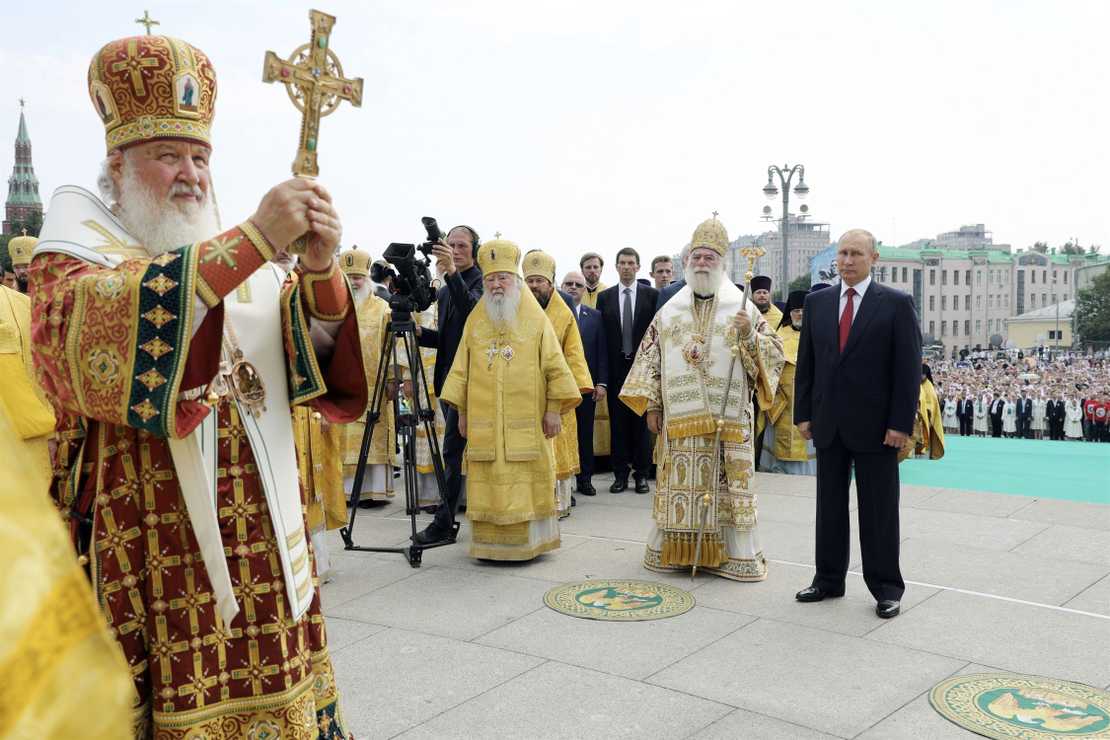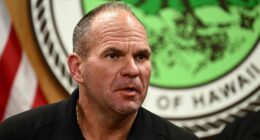
How can a purported leader of a major Christian denomination endorse the unprovoked invasion and oppression of a neighboring country? This week, over 200 priests and monks in the Russian Orthodox Church demanded an answer to that question from Patriarch Kirill. Now they may need to ask Kirill for another answer on how he squares his Christian beliefs with assassinating clerics:
The Primate of the Autocephalous Orthodox Church of Ukraine, gave an interview to ERT (Greek state TV), to its envoy in Kyiv, where he stressed that from the day that the attacks began until Thursday, they tried to kill him three times. …
Metropolitan Epiphaniy revealed that for three nights, Russians were entering the monastery, “to find me. I’ve been informed by foreign agencies that I’m target number five in the list of Russians to be killed. ”
That’s from Orthodox Times, a newer publication with a focus on Greece and the Balkans, where Russian Orthodoxy has a not-inconsiderable sway. So far this is the only report about Epiphanius’ claim, but it’s not exactly outside Vladimir Putin’s MO either. Those who oppose him have a nasty habit of falling out of windows, getting poisoned by polonium or nerve agents, or disappearing without a trace.
And Epiphanius I certainly hasn’t been silent before now either, which makes him a particular target for Putin’s ire. Religion News Service reported overnight that Epiphanius declared that “the spirit of Antichrist operates in the leader of Russia,” and likened Putin to Hitler:
“The spirit of the Antichrist operates in the leader of Russia, the signs of which the Scriptures reveal to us: pride, devotion to evil, ruthlessness, false religiosity,” he said, according to an automated translation of his statement. “This was Hitler during World War II. This is what Putin has become today.”
Epiphanius lauded “heroic people” who are “defending themselves from the attack of Russia,” saying, “every hour of our resistance inspires more and more people around the world to support Ukraine.” …
Epiphanius argued on Sunday that Russia’s attack on Ukraine may be changing the Russian faithfuls’ minds. He said that, while efforts to achieve church unity should be postponed until “after victory” against Russia, there are nonetheless “many hierarchs, priests, and laity of the Moscow Patriarchate who are already asking themselves about their future, which they do not associate with the discredited Patriarch Kirill.”
Kirill’s credit is evaporating inside his own Church, in Ukraine, and increasingly in Europe as well. Just days after the protest letter from Russian Orthodox clerics, the president of the Conference of European Churches demanded an answer as well, wondering what happened to Kirill’s devotion to the peace of Christ. Christian Krieger’s letter rebuked Kirill for not grasping that Christian churches have a higher calling that brute nationalism:
“Religious and political leaders around the world, as well as the faithful of different churches, are waiting for you to recognize the aggression, call on the political leadership of your country to end the war, and return to the path of diplomatic dialogue and international order,” reads CEC president’s letter to Patriarch Kirill, issued on 4 March 2022. “We call on you to affirm the value of all human lives, including the lives of Ukrainian citizens who are under attack.”
Krieger went on to say that like millions of Christians around the world, he is appalled by the aggression of the Russian armed forces against Ukraine, civilians, and thousands of people fleeing the country. “At the same time, I am disheartened by your daunting silence on the unprovoked war that your country declared against another country, which is home to millions of Christians, including Orthodox Christians that belong to your flock,” he added.
READ RELATED: Elizabeth Woods Ethnicity, Parents, Wiki, Biography, Age, Husband, Children, Net Worth & More
“As churches, our horizon is beyond national interests. I firmly believe that the Gospel of our Lord Jesus Christ carries a message of peace for all humankind that calls for deep respect for the dignity of every human being. This message is rooted in the mercy of the Triune God and the forgiveness God offers by the gift of Himself to anyone who comes to him. This message calls Christians, churches, and church leaders like us, to be artisans of peace and reconciliation,” he said.
I’m no theologian, but I’m struggling to find the scriptural support for assassinating priests and bishops in the New Testament, too. Maybe it’s in the first letter of Nero to the Romans.
The World Council of Churches added their voices to those pushing Kirill to separate his church from Putin. On Wednesday, acting general secretary of the WCC and Romanian Orthodox Father Ioan Sauca urged Kirill back to a position of seeking peace, tacitly suggesting that would be a nice change from Kirill’s current path. The Polish bishops of the Catholic Church were more blunt:
In an open letter published March 2, Romanian Orthodox Father Ioan Sauca, acting general secretary of the World Council of Churches, told Patriarch Kirill that he received numerous letters asking him to “approach Patriarch Kirill to mediate so that the war can be stopped and the suffering ended.”
“In these times of hopelessness, many look to you as the one who could bring a sign of hope for a peaceful solution,” Father Sauca wrote.
“I write to Your Holiness as acting general secretary of the WCC but also as an Orthodox priest,” he said. “Please, raise up your voice and speak on behalf of the suffering brothers and sisters, most of whom are also faithful members of our Orthodox Church.”
Polish Archbishop Stanislaw Gadecki of Poznan, president of the Polish bishops’ conference, echoed Father Sauca’s sentiments, calling on the Russian patriarch “to appeal to Vladimir Putin to stop the senseless warfare against the Ukrainian people.”
In the letter published by the Polish bishops’ conference March 2, Archbishop Gadecki also called on Patriarch Kirill to urge Russian soldiers “not to take part in this unjust war, to refuse to carry out orders which, as we have already seen, lead to many war crimes.”
“Refusing to follow orders in such a situation is a moral obligation,” the Polish archbishop wrote.
The reference to Nero is no coincidence in this matter. Kirill clearly either likes the power that he gets by making himself and his church subservient to Putin, or he’s afraid to do anything else. If it’s the former, there’s really no recourse to scripture that will convince Kirill. If it’s the latter, however, perhaps a reminder that Christianity has a long and glorious history of standing apart from temporal power even at the cost of martyrdom in order to spread the true Gospel to all. Kirill has to choose at some point whether he’s a warrior for Christ or for Putin. And that point is right the **** now.
Source:





